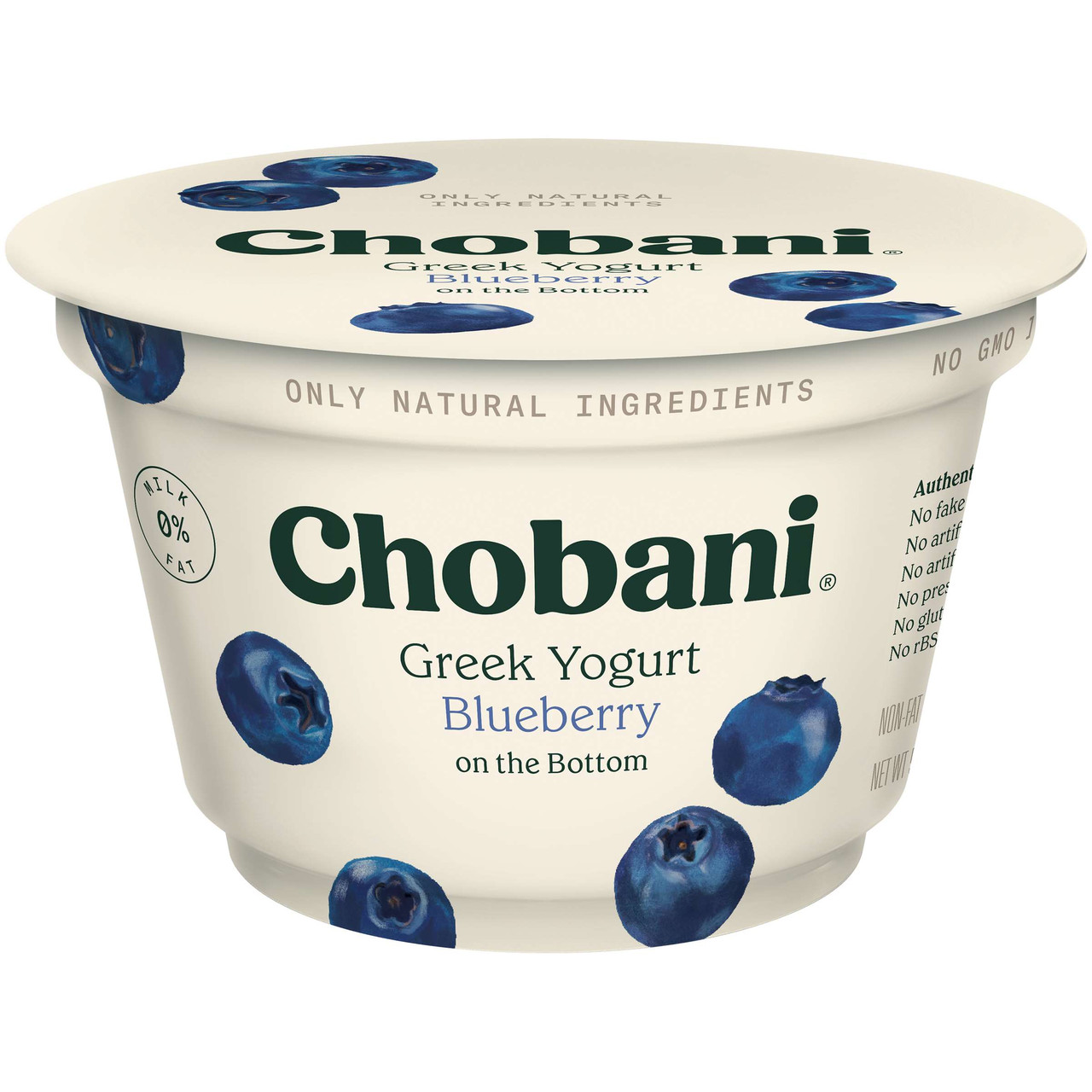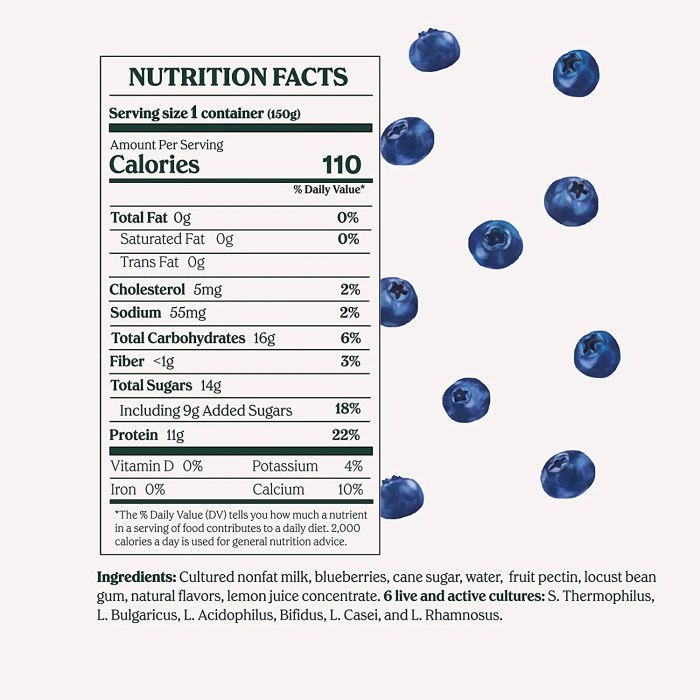Ingredient Analysis: Chobani Yogurt Blueberry Nutrition Facts

Chobani yogurt blueberry nutrition facts – Chobani blueberry yogurt’s ingredient list reveals a complex interplay of components contributing to its overall sensory experience and nutritional profile. A detailed examination of each ingredient illuminates its specific role in shaping the product’s texture, flavor, and nutritional value, while also highlighting potential allergens or sensitivities.
The ingredient list typically includes, but is not limited to, the following components:
Milk and Milk Products
The base of Chobani blueberry yogurt is typically pasteurized whole milk or a blend of milk solids. The milk provides the primary protein source (casein and whey), contributing significantly to the yogurt’s creamy texture and providing essential amino acids. The fat content in the milk influences the richness and mouthfeel. Whole milk yields a creamier texture compared to nonfat or low-fat options.
Variations in milk fat content will impact the final product’s caloric density and nutritional profile.
Live and Active Cultures
Specific strains of live and active cultures, such as Lactobacillus bulgaricus and Streptococcus thermophilus, are essential for yogurt fermentation. These cultures convert lactose (milk sugar) into lactic acid, resulting in the characteristic tangy flavor and thick consistency of yogurt. The presence of live and active cultures also contributes to the yogurt’s potential probiotic benefits, supporting gut health. Variations in the specific strains of cultures utilized can impact the overall flavor profile and probiotic effects.
Sugar
Sugar, often in the form of cane sugar or other sweeteners, is added to enhance the sweetness and balance the tartness of the lactic acid. The amount of sugar added significantly impacts the overall sweetness and caloric content of the yogurt. Consumers should carefully review the nutrition label to assess the sugar content in relation to their dietary preferences and health goals.
Reduced-sugar or no-sugar-added versions are available for those seeking to limit sugar intake.
Blueberry Puree or Fruit Filling
Blueberry puree or a fruit filling, usually containing blueberries, provides the characteristic blueberry flavor and color. The type and concentration of blueberry puree will affect the intensity of the blueberry flavor and the overall sweetness. The addition of other ingredients, such as pectin or other stabilizers, might be included in the fruit preparation to maintain the texture and prevent separation.
Other Additives, Chobani yogurt blueberry nutrition facts
Other ingredients may be present, such as natural flavors, pectin (a gelling agent), and modified food starch (for texture). These additives play minor roles in the overall sensory experience and often serve as stabilizers or emulsifiers to maintain the yogurt’s texture and consistency over time. The specific types and quantities of these additives can vary depending on the manufacturing process and the specific product formulation.
Potential Allergens and Sensitivities
The primary allergen concern associated with Chobani blueberry yogurt is milk. Individuals with milk allergies or lactose intolerance should avoid this product. Some individuals may also experience sensitivities to other ingredients, such as certain added flavors or stabilizers. Careful review of the ingredient list is crucial for those with specific dietary restrictions or allergies. Always check the product label for the most up-to-date ingredient information, as formulations may change.
Behold, the nutritional clash of titans! Chobani blueberry yogurt, a beacon of purported health, stands before us, its protein and probiotics a siren song. Yet, dare we compare it to the sugary siren call of a different kind? A glance at the sweet tart ropes nutrition facts reveals a stark contrast, a sugary tempest against the yogurt’s calmer seas.
Ultimately, the choice, my friend, rests upon your own desires: virtuous health or a fleeting sugary indulgence? The nutritional fate of your Chobani blueberry yogurt lies in your hands.
Health Benefits and Considerations

Chobani blueberry yogurt presents a complex nutritional profile, offering potential health benefits alongside considerations regarding its composition. A balanced assessment requires examining both the advantageous components and potential drawbacks inherent in its ingredients. This analysis will explore the positive contributions of protein, probiotics, and antioxidants, while also addressing concerns related to sugar content and other additives.The inclusion of protein, probiotics, and antioxidants in Chobani blueberry yogurt contributes significantly to its potential health benefits.
The protein content aids in satiety, supporting weight management and muscle maintenance. Probiotics, beneficial bacteria, contribute to a healthy gut microbiome, linked to improved digestion and immune function. Antioxidants, derived primarily from the blueberries, combat oxidative stress, potentially reducing the risk of chronic diseases.
Protein’s Role in Satiety and Muscle Maintenance
The protein in Chobani blueberry yogurt contributes to feelings of fullness, potentially aiding in weight management by reducing overall caloric intake. Adequate protein intake is also crucial for muscle growth and repair, particularly important for individuals engaged in regular physical activity. The specific amount of protein varies depending on the yogurt’s flavor and serving size, but generally, a serving provides a notable contribution towards daily protein requirements.
For example, a typical serving might provide 10-15 grams of protein, representing a significant portion of the daily recommended intake for some individuals.
Probiotics and Gut Health
Chobani blueberry yogurt often contains live and active cultures, commonly referred to as probiotics. These beneficial bacteria colonize the gut, promoting a healthy gut microbiome. A balanced gut microbiome is associated with improved digestion, enhanced nutrient absorption, and a strengthened immune system. Research suggests that regular consumption of probiotic-rich foods may alleviate symptoms of digestive disorders like irritable bowel syndrome (IBS) and reduce the risk of certain infections.
However, the specific strains and their efficacy vary between yogurt products.
Antioxidant Properties of Blueberries
Blueberries are rich in antioxidants, particularly anthocyanins, which are responsible for their vibrant color. These antioxidants help neutralize free radicals, preventing cellular damage and reducing oxidative stress. Chronic oxidative stress is implicated in the development of various chronic diseases, including heart disease, certain cancers, and neurodegenerative disorders. Therefore, the blueberry component of the yogurt contributes to the overall antioxidant capacity of the product, offering potential protection against these health risks.
Sugar Content and Other Ingredients
While Chobani blueberry yogurt offers several health benefits, its sugar content requires careful consideration. Added sugars can contribute to weight gain, increased risk of type 2 diabetes, and other metabolic disorders. The amount of added sugar varies depending on the specific yogurt type and flavor; consumers should carefully examine the nutrition label to assess the sugar content before regular consumption.
Additionally, the presence of other ingredients, such as thickeners and stabilizers, should be evaluated based on individual dietary needs and preferences.
Overall Health Impact of Regular Consumption
Regular consumption of Chobani blueberry yogurt, in moderation, can contribute to a healthy diet. The protein, probiotics, and antioxidants offer potential benefits for weight management, gut health, and disease prevention. However, careful consideration of the sugar content and other ingredients is essential to mitigate potential negative effects. Individual tolerance and specific dietary needs should guide consumption patterns. A balanced approach, incorporating Chobani blueberry yogurt as part of a varied and nutritious diet, is likely to yield the greatest health benefits.
FAQ Guide
Is Chobani blueberry yogurt suitable for people with lactose intolerance?
Chobani offers lactose-free options, but their standard blueberry yogurt contains lactose. Check the label carefully.
How does the sugar content in Chobani compare to homemade yogurt?
Homemade yogurt generally has lower added sugar. Chobani’s sugar content comes from both the fruit and any added sweeteners.
Can I freeze Chobani blueberry yogurt?
Yes, but the texture might change upon thawing. It’s best to freeze it in portions for smoothies or other recipes.
